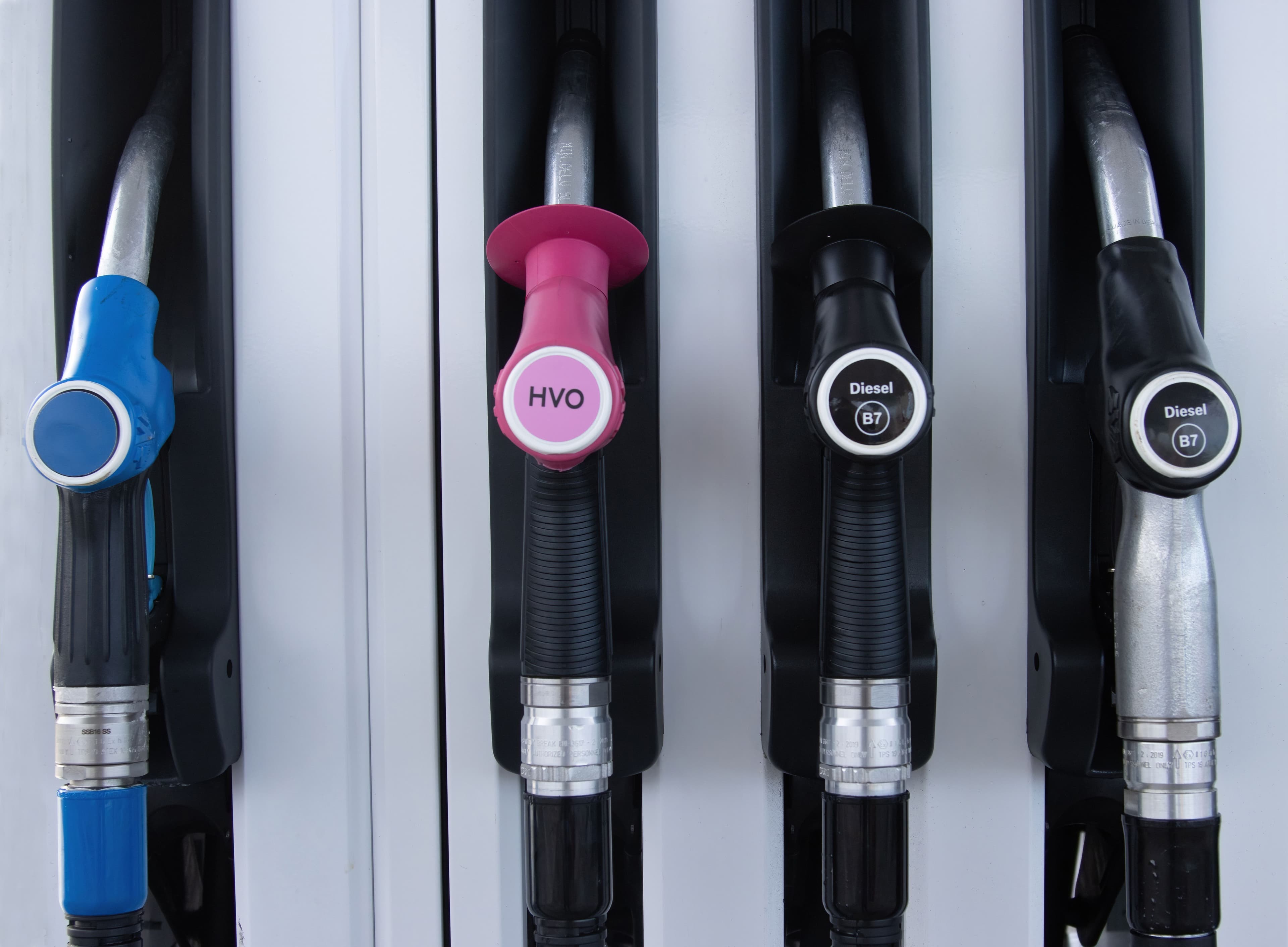HVO fuel for sustainable business travel

Improving your sustainability with HVO fuel for HGVs
Large fleets of trucks pose a unique challenge: balancing environmental impact with keeping deliveries on schedule. While it's much simpler to reduce emissions with smaller vehicles, this isn’t an option for businesses that need to transport large - or large volumes of - goods. That’s where alternative options like HVO fuel come in, making sustainable trucking with HGVs a much more realistic goal.

What is HVO fuel?
Hydrotreated vegetable oil is a fossil-free alternative to diesel fuel, with similar functionality and composition to its fossil-based counterpart. Its similarity to diesel makes it one of the simplest ways to transition to eco-friendly biofuel, requiring no tank or vehicle alterations to work with diesel-compatible engines. HVO is produced by processing renewable waste, improving the carbon footprint of the fuel even before it’s synthesised, bought, and burned.
The early 2020s have made HVO fuel more accessible in the UK in a step towards achieving a net-zero carbon target by 2050. HVO has fantastic potential when it comes to reducing a company’s carbon footprint, which is why HVO sites are being added to our UK Fuels network.

HVO fuel pros and cons
As with all fossil and biofuel options, there are positives and negatives to switching your fleet to HVO fuel. To make the best decision for your HGVs, it’s important to understand the impact that switching to hydrotreated vegetable oil will have on your business. Here are a few of the pros and cons of using HVO for your fleet.
| HVO fuel pros | HVO fuel cons |
| Processing HVO is relatively low-maintenance, and results in fewer harmful waste substances and sullied filters in the tank. | HVO is newly available and complex to create, making it more costly than diesel fuel. |
| HVO fuel produces up to 90% less CO2 than diesel, and emits fewer soot and waste products. | When burned, HVO fuel produces a volume of waste nitrogen that's equal to mineral diesel |
| HVO is biodegradable and fossil-free, significantly reducing a vehicle’s carbon footprint. | There is currently less feedstock available than is required to process high volumes of HVO, making land acquisition necessary for increased production. |
| HVO contains no sulphur particles, making it odourless and more pleasant to work with than other fuels. |

HVO fuel benefits
Using HVO fuel can be beneficial for both your company and the planet, and it can be done without the expensive tank adjustments that other biofuels can require.
Refuel with your fuel card
With fuel cards such as the Truckone card now compatible with HVO fuel, you can add sustainability to your weekly invoices with no extra paperwork.
Odourless refuelling
A sulphur-free composition makes HVO practically odourless, and more pleasant for drivers to work with.
Improve your ESG rating
Fossil-free HVO fuel significantly reduces your company’s carbon footprint, putting sustainability first.
Less engine maintenance
Fewer waste products result in less maintenance time for your engines, allowing your HGVs more time on the road.
How is HVO fuel made?
Hydrotreated vegetable oil is created by putting HVO feedstock through multiple chemical processes, including hydrogenation and hydrocracking. Through these processes, the feedstock is treated with hydrogen to produce hydrocarbons, which are then broken down to be built back into the desired fuel structure. The properties of these smaller hydrocarbon chains can be adjusted to achieve the required specifications.
What is hydrogenation?
Hydrogenation is the process of combining hydrogen (H2) with additional compounds. In the case of hydrogenated vegetable oil, this is done with fatty acid feedstock, saturating it so that the hydrogen can bond with and remove oxygen from the feedstock as water (H2O). This results in the separation of propane and water, priming the compounds for further processing.
What is hydrocracking?
Hydrocracking refers to the catalysed cracking of hydrocarbon chains into smaller components. This process can be adjusted depending on the desired fuel outcome, and will result in several different compound bonds of paraffinic hydrocarbons, all of which host a lower average of carbon atoms than the original hydrocarbon chains.

Is HVO fuel sustainable?
HVO fuel CO2 emissions are up to 90% lower than those produced by diesel fuel. This reduced volume of waste emission makes HVO a sustainable way to improve your ESG rating and reduce your carbon emissions. HVO fuel is also classified as biofuel, and is considered a sustainable alternative to diesel by authorities. HVO biofuel is an eco-friendly option for any vehicle built to process diesel, and considerably reduces its carbon footprint. Currently, feedstock for HVO fuel is not as abundant as fossil components, and it will be some time before it can be produced at the same volumes as traditional fuels. However, the use of fatty acid feedstock makes HVO creation a sustainable and renewable process, despite its limitations.

Buying HVO fuel with your fuel card
At Radius, we’re adding the option to purchase HVO fuel with our UK fuels and EDC cards. The option will also be added to some of our reseller cards in the future. Buying HVO fuel is easy with our fuel cards, simply fill up your vehicles and pay with your cards as normal. You’ll see the transaction in Radius Velocity as usual, and it will be added to your weekly invoice. Speak to our team today to find out more about switching to HVO fuel.

Frequently asked questions
Can’t find an answer to your question? Talk to our customer support team on 0344 880 2468. We’re here to help you with any questions or concerns you may have.
What colour is HVO fuel?
How much does HVO fuel cost?
Where can I buy HVO fuel?
Partnership
Why choose Radius?
With innovative solutions built around the needs of our customers, we've established an international reputation for helping businesses grow sustainably.
Expertise
Our team has over 34 years of experience helping more than 400,000 customers globally.
Trust
We are an internationally-acclaimed provider with numerous awards for our products and services.
Choice
Choose from our range of fleet, mobility and connectivity solutions that can be tailored to suit your needs.
Solutions
Use our award-winning technology and services to save your business time and money.



Need help?
Can’t find what you are looking for?
The customer support team at Radius has a global reach with over 50 offices to offer local contact with an international presence. Let us know how we can help.
Contact us
